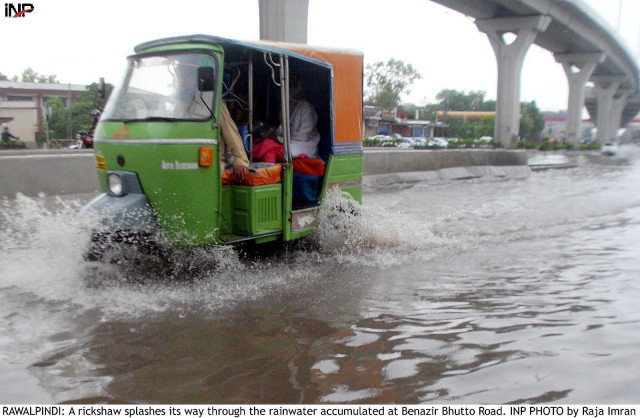Contingency plan issued to city’s hospitals
Hospitals directed to take precautions as monsoon approaches

DG Met Dept says that the showers will turn the hot and humid weather pleasant.
PHOTO: INP
“Hospitals have been told to establish rain emergency units and acquire medicines necessary to deal with the increased flow of patients during the monsoon season,” he told The Express Tribune.
Contingency plans have also been made for trauma management, as increased cases of road accidents, collapse of roofs and walls and electrocution are likely, he added.
Directives have also been issued to district and town health officers to take emergency measures before the rains, ensure the provision of medicines and appoint a focal person in every district.
The Karachi Water and Sewerage Board (KWSB) has yet to issue a contingency plan for Eid and the pre-monsoon.
Pre-monsoon rains soon, predicts Met office
Due to the rainfall there are chances that the water level at the Hub Dam will rise; it is currently at dead level. The condition of the sewerage system is also unsatisfactory, as most of the open grounds are inundated with sewage water in the Landhi and Korangi areas. In District West, most of the areas in Orangi Town are bogged down with sewage water.
Due to the KWSB’s inefficiency, the majority of areas in the outskirts of the city are filled with sewage, which, after mixing with rainwater, can cause serious damage to the citizens’ health.
K-Electric (K-E) has yet to issue a contingency plan for the monsoon season. “However, ongoing, continuous measures are being taken to make the system efficient,” said utility’s focal person. He added that heavy rainfall causes faults in their system and to avoid major issues the power utility switches off their system in some areas.
According to him, the major causes of electrocution are those who use ‘kundas’ and steal electricity. The focal person appealed to people to stop stealing electricity during monsoon season at least and cooperate with K-E officials.



















COMMENTS
Comments are moderated and generally will be posted if they are on-topic and not abusive.
For more information, please see our Comments FAQ